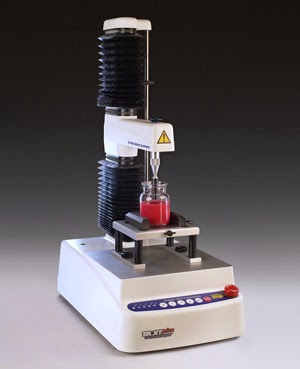 Hysteresis
in the context of deforming a material is the loss of energy in the
form of heat when a sample is loaded then unloaded.
Hysteresis
in the context of deforming a material is the loss of energy in the
form of heat when a sample is loaded then unloaded. This occurs due to internal friction, and so the effect is larger for a material such as rubber, which requires the movement of large molecular chains each time it is stretched or compressed. If a piece of rubber is deformed several times in the hands, this loss of energy can be felt directly as the sample heats up.
As can be seen on the graph, the deformation of a viscoelastic material follows a different path on the load and unload cycles. The unload cycle shows that the material is slower to recover compared to the load cycle. This difference in recovery is known as hysteresis, which is due to energy dissipation by the generation of heat.
Elastic hysteresis is a more significant effect when the load-unload cycles are performed more quickly, and so when this effect is investigated during a tensile or compressive test, it is important to ensure the loading and unloading test speeds are the same as each other, and kept constant for all runs.
How to measure hysteresis
The level of hysteresis is defined as a percentage, and is calculated by measuring the area within the loop (shown as the red shaded area), compared to the total area (shown as the red + blue shaded area). This can be carried out very simply by the use of a macro in Exponent.
Area A refers to the heat dissipated or energy absorbed, and area B refers to the elastic potential of the material (or energy returned on unloading).
There is a Texture Analysis test for virtually any physical property. Contact Stable Micro Systems today to learn more about our full range of solutions.
For more information on how to measure texture, please visit the Texture Analysis Properties section on our website.
 The TA.XTplus texture analyser is part of a family of texture analysis instruments and equipment from Stable Micro Systems. An extensive portfolio of specialist attachments is
available to measure and analyse the textural properties of a huge range of
food products. Our technical experts
can also custom design instrument fixtures according to individual
specifications.
The TA.XTplus texture analyser is part of a family of texture analysis instruments and equipment from Stable Micro Systems. An extensive portfolio of specialist attachments is
available to measure and analyse the textural properties of a huge range of
food products. Our technical experts
can also custom design instrument fixtures according to individual
specifications.No-one understands texture analysis like we do!
To discuss your specific test requirements click here...
 |  |  |



No comments:
Post a Comment